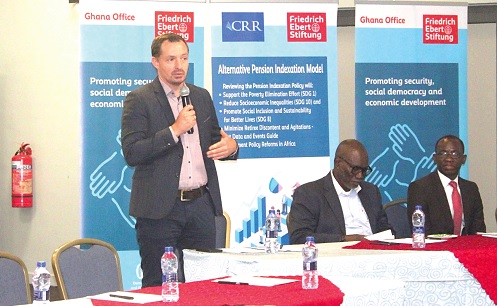Poverty among Ghanaian pensioners high


Martin Guettler, Country Representative, Friedrich Ebert Stiftung, addressing the stakeholders at the event. Looking on are Dr Frank Odoom (2nd from right), Advisory Board Chair, Africa Centre for Retirement Research, and Abdallah Mashud (right), research team lead, Africa Centre for Retirement Research. Picture: ERNEST KODZI
There is a high incidence of poverty among Ghanaian pensioners, a survey conducted by the Africa Centre for Retirement Research (ACRR) has revealed.
Using a poverty measurement threshold of $2 a day, the survey found that three out of every five pensioners, representing 60 per cent, were poor and struggled to live well in retirement.
The Executive Director of ACRR, Abdallah Mashud, who presented the findings of the survey on October 22 at a stakeholder engagement, therefore, called for a review of the current pension system in order to make it more efficient and equitable for the beneficiaries.
Mr Mashud said ACRR proposed the means-testing approach, which suggested that instead of awarding an equal fixed-rate increment for all pensioners, the country varied it such that high monthly pension-earners received a moderately lower fixed rate as compared to low monthly pension-earners.
He explained that the proposed method aimed to minimise the growing socioeconomic inequalities among Ghanaian pensioners and also improve the medium to long-term financial sustainability of the First-Tier Social Security and National Insurance Trust (SSNIT) Scheme.
Mr Mashud stated that the current method, based on wage and inflation indexation, had the shortcoming of increasing economic disparities between the rich and the poor, and it did not have an inbuilt strategy to shield the SSNIT scheme from inflationary risk.
The poverty relief mechanisms under it were insufficient and, therefore, did not provide enough financial protection for the poor, Mr Mashud said at the engagement on the alternative pension indexation model organised by ACRR in collaboration with the Friedrich Ebert Stiftung (FES).
Findings
The report found that there were growing economic inequalities between poor, low earners and rich, high earners and anytime the country indexed pensioners using the current model, the economic gap between the rich and the poor widened, a situation which it said was at variance with the social security principle of solidarity and practices of the world.
Mr Mashud said the survey further revealed that seven in 10 retirees felt that the benefits provided under the Social Security programme were inadequate, with almost four in five respondents or 78 per cent strongly asking that the country’s current pension indexation policy be reformed to reflect full price increases and also provide equitable and improved financial protection for poor retirees.
He said of the 1,700 pensioners across all the 16 regions that were surveyed, three per cent were somewhat indifferent about changing the current pension indexation policy, while one per cent said they strongly disagreed with it being changed.
With the majority of the pensioners calling for the review of the country’s indexation policy, he said it was about time it was reviewed so that the benefit provisions could be improved and the country could do more for poor pensioners in line with the very objective of social security.
“Given the problems, a deliberate and well-targeted indexation policy is needed, and this will be consistent with the pension reform that we have all over the world.
Globally, everybody is undertaking pension reforms, and the focus is to make more money for the poor people so that we can really ensure that we are one world,” he stressed.
Means-testing approach
Mr Mashud said ACRR proposed the means-testing approach, which suggested that instead of awarding an equal fixed-rate increment for all pensioners, the country varied it such that high monthly pension-earners received a moderately lower fixed rate as compared to low monthly pension-earners.
He explained that the newly proposed method aimed to minimise the growing socioeconomic inequalities among Ghanaian pensioners and also improve the medium to long-term financial sustainability of the First-Tier SSNIT Scheme.
Inequalities
Commenting on the report, Country Representative of the FES, Martin Guettler, said Ghana, just like Germany, had similarities concerning inequalities in the pension system, and he hoped that they could both learn from each other’s experiences.
The Advisory Board Chairperson of ACRR, Dr Frank Odoom, said pension provision in Ghana had gone through a lot of changes, pointing out that currently, the three-tier pension scheme seemed the right way to go, albeit with some challenges.
He said the first-tier scheme provided by the state, that is, the basic national social security scheme, was expected to provide certain benefits that could provide some security to all its contributing members after they retired.
However, he added, that was not the situation, as very low pension earners seemed to lose their security as the presence of the annual pension increases made the higher-earning pensioners widen the gap between the two groups.
Background
SSNIT has often counselled workers to insist on higher basic pay rather than connive with their employers to channel a greater portion of their earnings into allowances in order to avoid paying what they perceive as “huge taxes” and the corresponding 13.5 per cent contributions due SSNIT.
Per the current Pensions Act — the National Pensions Act, 2008 (Act 766) — workers who contribute for 35 years and beyond are entitled to receive the maximum Pension Right, which is up to 60 per cent of their Average Three Best Years’ basic salaries as their starting pension, subject to annual increments.
For instance, a person who earns GH¢1,000 monthly as basic salary, with additional allowances totalling GH¢5,000, would receive 60 per cent of GH¢1,000 after contributing for 35 years.
That is GH¢600 as a monthly pension after retirement, instead of GH¢3,000 if the entire GH¢5,000 had been declared to SSNIT as the basic salary.
This is why SSNIT has been advising employees to impress upon their employers not to push more of their earnings into allowances, but rather to consolidate them with their basic salaries so that their pensions would be enhanced upon retirement.
Checks by the Daily Graphic indicate that more than 257,000 people are currently on the SSNIT pension payroll.
While the highest pension receiver takes home about GH¢201,000, with others within that band earning more than GH¢100,000, those receiving about GH¢1,000 are in the majority.
The smallest pension amount currently is GH¢300. Indeed, there are still people working today whose basic salaries are as low as GH¢400 a month.
This reality highlights the importance of proper salary structuring and compliance with the SSNIT Scheme.
Therefore, SSNIT has been encouraging workers to take a long-term view of their income by ensuring that their basic pay reflects their true earnings, because the decisions made today will determine their comfort and dignity in retirement.
DISCLAIMER: The Views, Comments, Opinions, Contributions and Statements made by Readers and Contributors on this platform do not necessarily represent the views or policy of Multimedia Group Limited.
DISCLAIMER: The Views, Comments, Opinions, Contributions and Statements made by Readers and Contributors on this platform do not necessarily represent the views or policy of Multimedia Group Limited.
Source link





